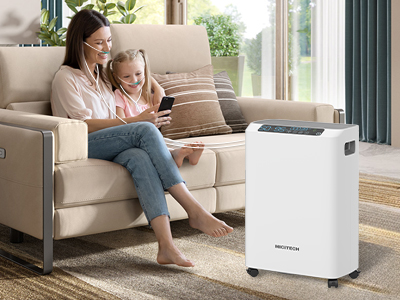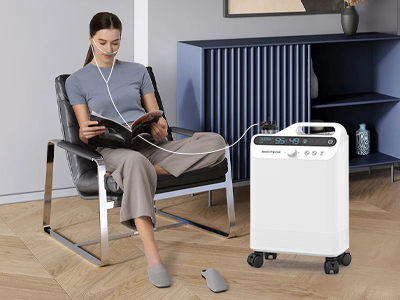28 May 2024
Access to oxygen therapy is vital for many patients, especially those with chronic obstructive pulmonary disease (COPD), emphysema, and other respiratory ailments. The availability of oxygen concentrators, whether through rental or purchase, ensures that patients receive the care they need.

Understanding Oxygen Concentrators
A. How Oxygen Concentrators Work
Oxygen concentrators function by drawing in ambient air, which contains approximately 21% oxygen. The device then filters and concentrates the oxygen, delivering a higher percentage of oxygen directly to the patient. This process helps improve oxygen saturation in the blood, alleviating symptoms of hypoxemia.
B. Types of Oxygen Concentrators
There are two main types of oxygen concentrators: stationary and portable. Stationary units are designed for home use, providing a continuous flow of oxygen. Portable units are compact and battery-operated, offering greater mobility for active patients.
Factors to Consider When Choosing Between Rental and Purchase
A. Duration of Need
One of the primary factors to consider is the duration of need. Short-term requirements, such as post-surgery recovery, may be best served by renting an oxygen concentrator. In contrast, chronic conditions often necessitate long-term use, making purchasing a more viable option.
B. Cost Comparison
Evaluating the cost implications is crucial. While renting might appear less expensive initially, long-term costs can accumulate. Conversely, purchasing involves a significant upfront investment but can prove more economical over time.
C. Maintenance and Repairs
Maintenance and repairs are important considerations. Rental agreements typically include maintenance and repair services, ensuring the oxygen concentrator remains in optimal condition. Ownership, however, requires the user to handle and fund any necessary upkeep and repairs.
Benefits of Renting an Oxygen Concentrator
A. Flexibility and Convenience
Renting offers unparalleled flexibility and convenience. Patients can easily return or exchange the oxygen concentrator as their needs change. This is particularly advantageous for those who may only need the oxygen concentrator temporarily.
B. Access to Latest Technology
Rental services often provide access to the latest technology. This means patients can benefit from the newest, most efficient models without the burden of purchasing an expensive oxygen concentrator.
C. Support and Services
Rental agreements typically include comprehensive support and services. This can range from 24/7 customer support to regular maintenance checks, ensuring the concentrator operates smoothly.

Advantages of Purchasing an Oxygen Concentrator
A. Long-Term Cost Efficiency
For long-term users, purchasing an oxygen concentrator can be more cost-efficient. The initial investment may be high, but over time, the expense is likely to be lower than ongoing rental fees.
B. Personalization and Customization
Ownership allows for personalization and customization. Patients can choose an oxygen concentrator that best suits their lifestyle and preferences, ensuring a more tailored oxygen therapy experience.
C. Independence and Ownership
Purchasing an oxygen concentrator provides a sense of independence and ownership. Patients are not reliant on rental schedules or policies, giving them more control over their treatment.
Financial Considerations
A. Insurance Coverage
Insurance coverage is a significant factor. Some insurance plans may cover the cost of rental or purchase, either partially or fully. It's important to check with the provider to understand the extent of coverage available.
B. Rental Fees vs. Purchase Costs
Comparing rental fees to purchase costs is essential. Rental agreements might include monthly fees that add up over time, whereas purchasing involves a one-time cost. Weighing these options can help in making an informed decision.
C. Additional Expenses
Additional expenses such as maintenance, repairs, and accessories should also be considered. These costs can impact the overall affordability and practicality of renting versus purchasing.
Case Studies and User Experiences
A. Stories from Long-Term Renters
Many long-term renters have shared positive experiences, highlighting the convenience and flexibility of renting. These stories often emphasize the ease of upgrading to newer models and the support provided by rental companies.
B. Testimonials from Buyers
Testimonials from buyers typically focus on the cost savings and independence associated with ownership. Users often appreciate the ability to customize their oxygen concentrators and the long-term reliability of owning a concentrator.
Making the Right Decision
A. Assessing Individual Needs
Assessing individual needs is paramount. Factors such as the severity of the condition, lifestyle, and personal preferences should guide the decision-making process.
B. Consulting Healthcare Professionals
Consulting healthcare professionals is crucial. Doctors and respiratory therapists can provide valuable insights and recommendations based on the patient's specific medical needs.
C. Evaluating Lifestyle Factors
Evaluating lifestyle factors, such as travel frequency and daily activities, is essential. Portable units might be more suitable for active individuals, while stationary units can cater to those who spend more time at home.
Conclusion
A. Summary of Key Points
In summary, both renting and purchasing an oxygen concentrator have distinct advantages. Renting offers flexibility, access to the latest technology, and comprehensive support, while purchasing provides long-term cost efficiency, personalization, and independence.
B. Final Thoughts on Choosing the Best Option
Choosing the best option ultimately depends on individual needs, financial considerations, and lifestyle factors. By carefully evaluating these aspects and consulting with healthcare professionals, patients can make an informed decision that best suits their oxygen therapy requirements.
Keywords: oxygen concentrator
Originally published 28 May 2024, updated 28 May 2024.